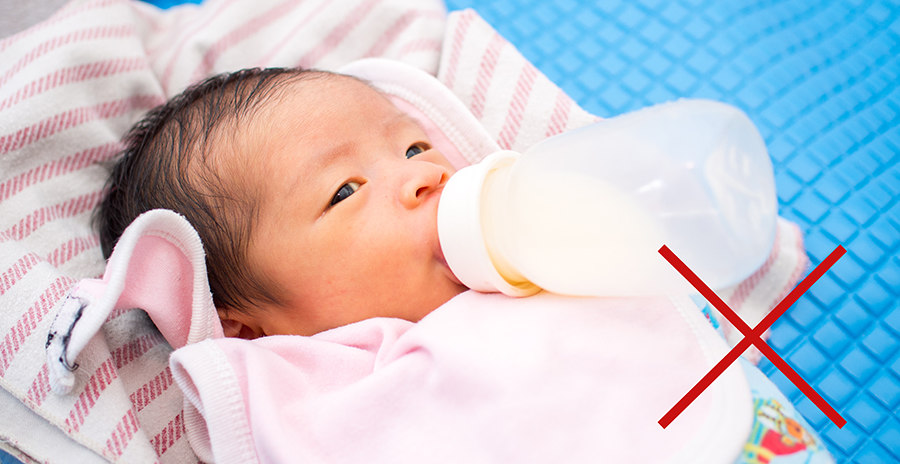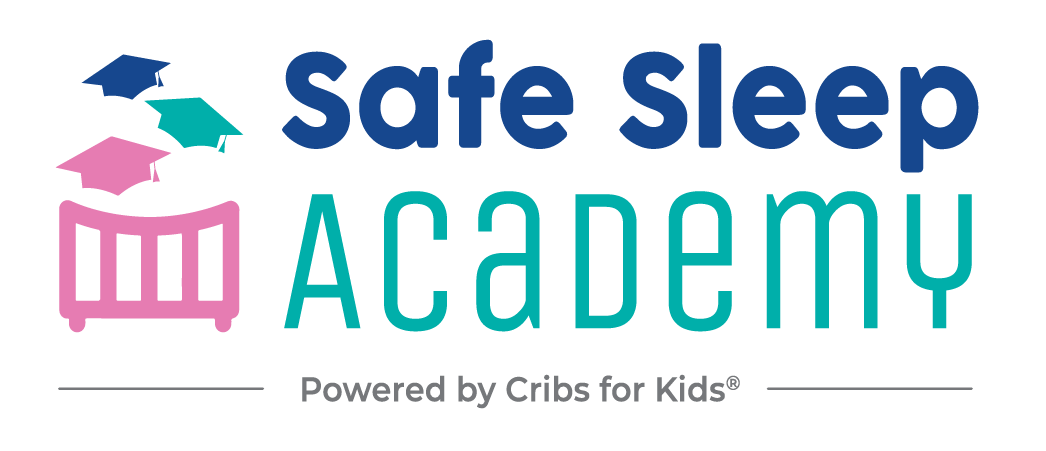Figuring out when and how often to feed your baby can be one of the toughest things for new parents to learn during the first few months of life. Always check with your pediatrician. They will be able to tell you the best schedule for feeding your baby as well as give you advice and answers on any questions you may have.
Breastfeeding
 The American Academy of Pediatrics recommends exclusive breastfeeding for the first six (6) months of life. After the first six (6) months of life, breastfeeding should continue until at least the infant’s first birthday.
The American Academy of Pediatrics recommends exclusive breastfeeding for the first six (6) months of life. After the first six (6) months of life, breastfeeding should continue until at least the infant’s first birthday.
To read more about breastfeeding CLICK HERE.Bottle Feeding
Although “Breast is Best,” we at Cribs for Kids® recognize and understand that not everyone is able to breastfeed.
Whether you are using a bottle with breastmilk or formula, you should avoid bottle propping. Bottle propping is when you lean or rest the bottle against a pillow, rolled up blanket, or another object instead of holding it while your baby eats.
Bottle propping can have several negative consequences. Firstly, if can lead to overeating because even once the baby is done eating they cannot stop swallowing the liquid until it completely drains from the bottle. In the worst cases, it can even be the cause of choking. Secondly, bottle propping can increase the risk and occurrence of ear infections and gas. And lastly, it increases the risk of tooth decay, because of the way the breastmilk or formula pools in the mouth.

Additionally, the American Academy of Pediatrics recommends that only breastmilk or formula be put in an infant’s bottle, unless otherwise instructed by a pediatrician. Babies are not supposed to have solid food until about six (6) months of age. Putting things like rice or cereal into a bottle with breastmilk or formula before a baby is ready can lead to gagging, or even choking. It also increases the risk of overeating because your baby generally knows how much breastmilk or formula it is going to drink by the amount, not by its calorie intake. So, if you add cereal to your baby’s milk, they will drink the same amount of liquid, but take in many more calories.
Introducing Solid Foods
 The American Academy of Pediatrics (AAP) recommends that infants be introduced solid foods around 6 months of age. Infants should not be given solid foods before at minimum 4 months of age because it increases the risk of weight gain and obesity both in infancy and childhood. It also increases the risk that your baby will develop food allergies later in life.
The American Academy of Pediatrics (AAP) recommends that infants be introduced solid foods around 6 months of age. Infants should not be given solid foods before at minimum 4 months of age because it increases the risk of weight gain and obesity both in infancy and childhood. It also increases the risk that your baby will develop food allergies later in life.Around 6 months of age, when you introduce your baby to solid foods, you should expose them to various healthy foods that offer a wide variety of textures and flavors. Remember, babies may need to be exposed to different foods several times before they like them. So, don’t get discouraged on the first try!
How do I know if my baby is hungry?
 For full weight and healthy infants, there are some signs that you can look for that will give you a little hint when your infant is hungry
For full weight and healthy infants, there are some signs that you can look for that will give you a little hint when your infant is hungry- Pay attention to their tongue! – If your baby is licking their lips or sticking out their tongue they may be telling you that they are hungry.
- Rooting – Rooting is the reflex that babies have for breastfeeding. If you notice that they are moving their mouth and/or head in search of the breast they are hungry.
- Putting their hands to their mouth
- Opening their mouth
- Putting objects in their mouth and sucking on them
The last sign that your baby may be hungry is if they get fussy or start crying. However, there are several reasons a baby may be fussy or crying, it does not always mean they are hungry. To read more about reasons why babies cry CLICK HERE.
Am I feeding my baby too much?
 Bottle fed babies are more likely to overeat than are breastfed babies. So, if you are bottle feeding your baby, you may want to take a little more precaution. However, babies are typically only take in what they need.
Bottle fed babies are more likely to overeat than are breastfed babies. So, if you are bottle feeding your baby, you may want to take a little more precaution. However, babies are typically only take in what they need.If you are concerned that you are overfeeding your baby monitor your baby for stomach pain, gas, and spit up. If your baby experiences any of these symptoms, talk to your pediatrician. Your doctor will be able to tell you if these symptoms are abnormal for your baby.
To avoid overfeeding, do not:
- Do not feed your baby every time he/she cries. Remember, not every cry means I am hungry!
- Prop up your baby’s bottle
- Add solid food into your baby’s bottle
- Use the slowest flow nipple for your baby’s bottle

